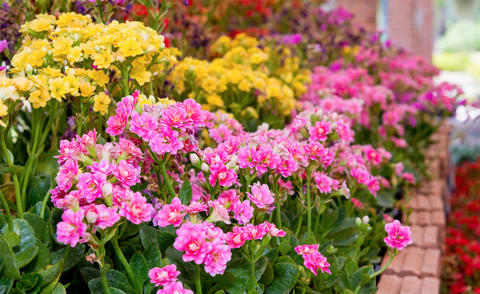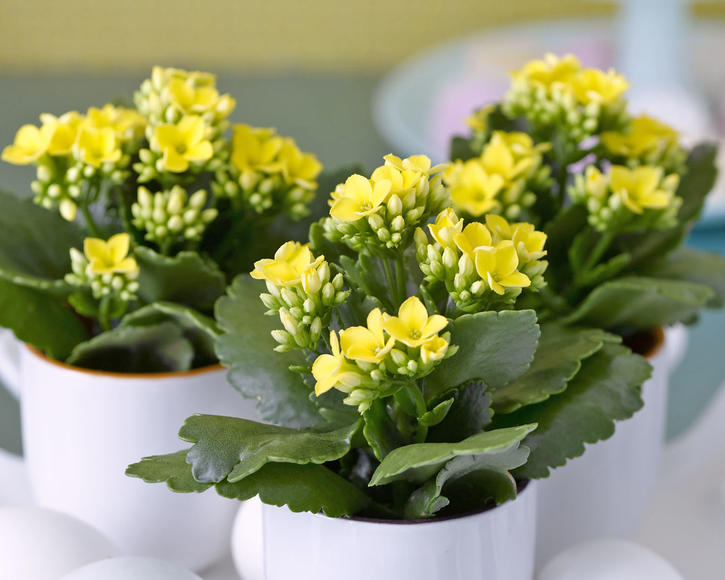Flaming Katy
Flaming Katy enjoys great popularity as a windowsill classic with its thick, fleshy leaves and flowers in a variety of colors. Here’s how to care for the robust plant.
Factsheet
- Growth type
-
- Succulent
- Growth height (from)
- from 15 cm to 30 cm
- Growth characteristics
-
- upright
- bushy
- Flower color
-
- yellow
- orange
- red
- pink
- Flowering time (month)
-
- February to June
- Flower shape
-
- terminal
- Leaf color
-
- green
- page format
-
- full margined
- Light
-
- sunny to scattered light
- Soil type
-
- gravelly to sandy
- Soil Moisture
-
- moderately dry to fresh
- Nutrient requirements
-
- moderately nutritious
- Decorative or utility value
-
- Flower Decoration
- Use
-
- Interior greening
- Planters
- Winter garden
- Warm House
- Garden style
-
- Pot garden
Flaming Katy, also known as Madagascar Widow's Thrill, only refers to the species Kalanchoe blossfeldiana from Madagascar. The low-maintenance plant takes the name Flaming Katy from the first red varieties. There are about 200 species of Kalanchoe in total. Besides Kalanchoe blossfeldiana, the genus also includes Kalanchoe manginii, Kalanchoe miniata, Kalanchoe daigremontiana and Kalanchoe tubiflora (mother of millions). All species of the genus Kalanchoe belong to the stonecrop family (Crassulaceae). There are a wide range of varieties with red, yellow, white, orange, and pink flowers. Although all Kalanchoe are short-day plants, meaning that their natural flowering period is during winter, Flaming Katy flowers all year round in this country.
Kalanchoe blossfeldiana forms succulent leaves and reaches a height of around 12 inches.
The thick, fleshy leaves of Flaming Katy are dark green, and have red, entire, or crenate margins.

Depending on the variety, the flower heads are yellow, orange, pink, or classic red. There are now also double-flowered varieties of Kalanchoe blossfeldiana.
Flaming Katy prefers a bright location all year round at temperatures of around 65 to 68 degrees Fahrenheit out of the blazing midday sun. The houseplant can also be put outdoors in summer. Kalanchoe should be kept in cooler conditions in winter, but not below 59 degrees Fahrenheit. To stimulate new flowering, you can keep the plant as a short-day plant from November. This means: For approximately six weeks, it requires a maximum of nine hours of light each day at 61 to 64.5 degrees Fahrenheit. Cover the plants with a box or bucket for dark conditions.
Cactus soil is a suitable substrate for Flaming Katy.
Water Flaming Katy as required throughout summer, allowing the surface of the substrate to dry out before watering again. Anything that is left in the saucer should be removed a few minutes later in order to avoid waterlogging. As the leaves of Kalanchoe blossfeldiana are succulent and store water, they can survive long dry periods without any problems. Reduce the amount of water in fall, only slightly moistening the soil.
Feed Flaming Katy by adding cactus fertilizer to the water every two weeks between spring and fall.
The plant can be repotted after flowering. It should be put in a larger pot if required.
Wilted flowers should be removed regularly. The houseplant can be pruned after flowering.
There is a wide range of varieties with different flower colors. Miniature forms and double-flowered varieties are also available.

Flaming Katy can be propagated by cuttings: Take terminal cuttings with two or three pairs of leaves, and put them in their own little pots filled with soil and sand. The cuttings form roots at temperatures of 68 to 71.5 degrees Fahrenheit.
Flaming Katy is extremely robust and therefore pest infestations are very uncommon. However, the roots rot easily if the planted is waterlogged.

